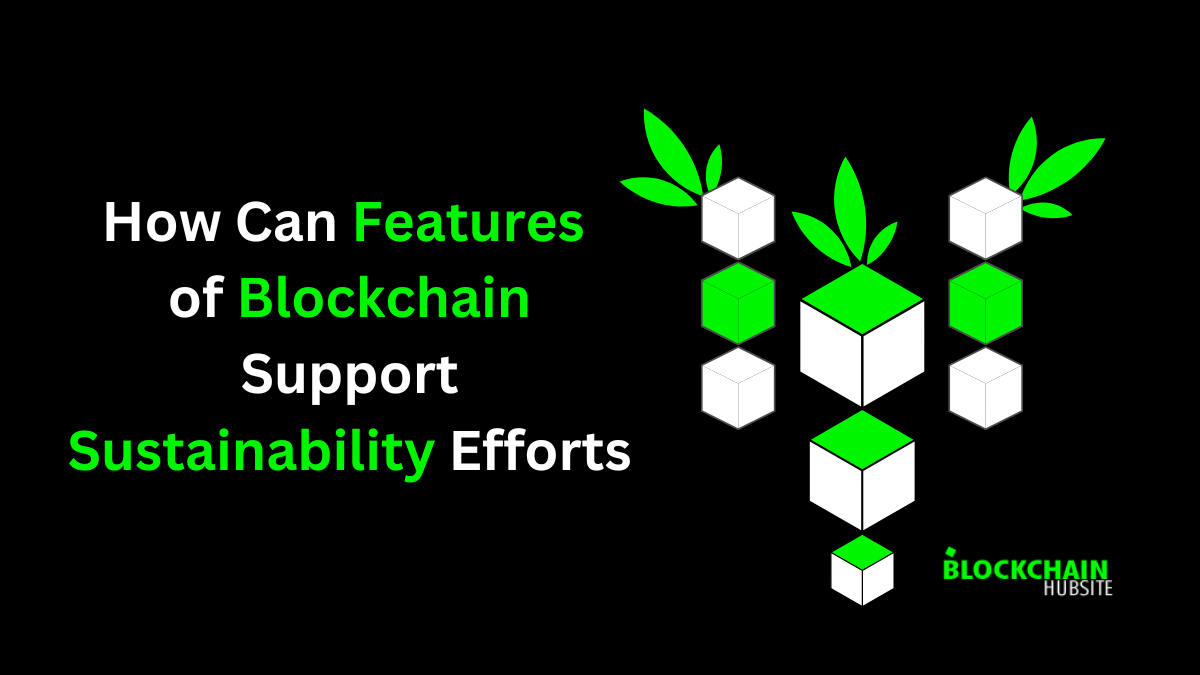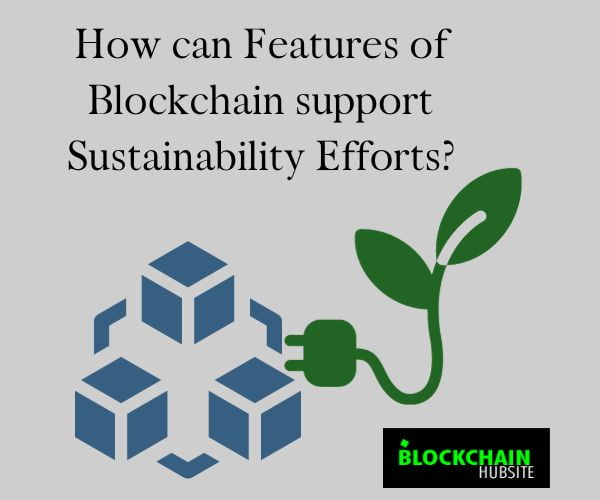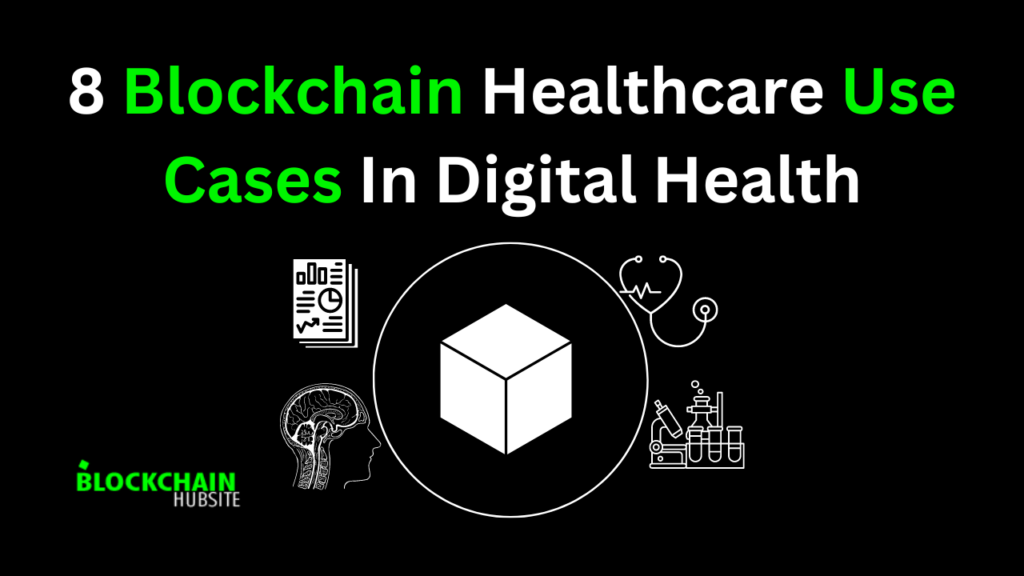
Table of Contents
Introduction
In recent years, sustainability has become a priority for individuals, businesses, and governments. A greater emphasis on renewable energy, waste reduction, and environmental protection has resulted from the demand for sustainable practices. Recently, however, blockchain technology has emerged as a resource that can help in these sustainability efforts. This article will look at various blockchain features that can support sustainable business operations.
What is Blockchain Technology?
Blockchain is a distributed, immutable ledger that can record transactions and stay updated on assets in a networked corporate environment. Real estate, vehicles, money, and land are all examples of real assets (intellectual property, patents, copyrights, branding). A blockchain network can record and exchange virtually any asset, eliminating intermediaries and lowering transaction costs.
What is sustainability?

In its broadest definition, sustainability means the ability to continue or support a process over time. The goal of sustainability in economics and public policy is to ensure that finite material resources are preserved for future generations.
Overview of Sustainability Efforts
Sustainability efforts are measures performed to satisfy current demands while not interfering with the ability of future generations to satisfy their own needs. Sustainable development aims to build a future where economic growth, environmental protection, and human happiness are balanced over the long term. The three fundamental components of a sustainable society are:
Environmental sustainability: This refers to initiatives to safeguard and rehabilitate the environment’s natural components, such as the air, water, land, and biodiversity. Reducing carbon emissions, conserving natural resources, supporting renewable energy, and lessening waste and pollution are all essential components of a sustainable environment.
Social sustainability: This refers to initiatives to guarantee that all people have access to necessities for life, including food, shelter, healthcare, education, and safety. The concept of social sustainability also includes the promotion of social justice, equality, and community involvement.
Economic sustainability: Economic sustainability means that people are working to help the economy grow in a way that is good for everyone. Fair work, income inequality, and sustainable production and consumption promote economic sustainability.
How can Features of Blockchain support Sustainability Efforts?

1. Increased transparency
Increasing transparency is essential to sustainability efforts because it enables people, organizations, and governments to understand better how their actions affect the environment and society. Blockchain technology has recently emerged as a tool that can boost transparency in several ways. These include the automated tracking of resource consumption, increased data accuracy, and enhanced product traceability.
Automated tracking of resource consumption
Blockchain technology can automate resource consumption tracking, making tracking and reducing spending on using natural resources simpler. Smart meters can track how much energy a building uses, and this information can be automatically added to a blockchain ledger. This enables continuous tracking of energy use, which in turn can reveal potential sources of savings.
Improved accuracy of data
In addition to facilitating transparency and reducing duplication of efforts, blockchain technology can increase data reliability concerning green initiatives. Since blockchain is an immutable ledger, the information stored there is incorruptible and cannot be removed. This is especially relevant in supply chain management, where precise records are needed to guarantee eco-friendly sourcing and reduce waste.
Improved traceability of goods
Product origin and environmental impact can be more easily determined thanks to increased transparency in the supply chain made possible by blockchain technology. This can encourage sustainable practices by making the supply chain more open and accountable. For instance, a blockchain-based system can be used to verify the ethical and environmentally friendly sourcing of raw materials.
2. Enhanced efficiency of operations

The use of blockchain technology enables the use of software to verify transactions, which can aid in the reduction of errors and the maximization of efficiency. This is especially significant when considering the importance of precise and reliable data in sustainability efforts. For example, blockchain-based systems can be used to check where the materials that go into a product come from, ensuring they are sourced ethically and sustainably.
Reduced transaction costs
Blockchain technology also aids in lowering transaction costs, which is especially useful for small and medium-sized firms that may not have the capital to withstand excessively high transaction fees. Blockchain technology has the potential to greatly lower the costs connected with energy trading, supply chain management, and other sustainability-related activities by eliminating the intermediaries and automating the transaction processes involved in each.
Elimination of the need for middlemen
No need for intermediaries: Another big advantage of blockchain technology is that it eliminates the need for intermediaries. Blockchain’s ability to create a decentralized and transparent record means it can facilitate direct transactions between individuals and companies, cutting out intermediaries and boosting efficiency. As a result, supply chain management and other sustainability-related activities can be made easier and less expensive, which in turn helps spread environmentally friendly practices.
3. Improved security of data

The increased data security provided by blockchain technology not only aids sustainability efforts but also improves the efficiency of operations. This can be accomplished through decentralized data storage, imposing access restrictions, and enhancing data accuracy and consistency.
Decentralized storage of data
Blockchain technology enables decentralized data storage, which means information may be stored over a distributed network of computers rather than in a centralized location. Reducing the probability of data loss, hacking, or other security breaches can improve the data’s security and dependability. Decentralized data storage can be especially useful in sustainability activities, where data accuracy and reliability are important for making good decisions.
Increased access control of data
Data access control can be improved using blockchain technology, which enables more precise permission settings. Data breaches are less likely to occur, and sensitive information is safeguarded when only authorized individuals or organizations can access it. This is particularly crucial when dealing with sustainability-related operations that may contain sensitive information concerning resource utilization, emissions, and other environmental impact data.
Improved accuracy and consistency of data
One final way blockchain technology might help improve the reliability of our data is by serving as a trusted, verifiable record source. Since blockchain is an immutable ledger, the information written on it can’t be changed or erased. This ensures everyone has access to the same accurate and consistent information. This can be very important in activities related to sustainability, where accurate and reliable data is needed to measure progress toward sustainability goals.
Areas Where Blockchain Can Accelerate Sustainable Development

Imagine if blockchain could help tackle the world’s biggest environmental issues. Indeed, it is possible. In fact, blockchain may significantly alter our approach to sustainability in several sectors. Some of the most important ones are listed here.
Climate Change: By transparently tracking and recording transactions, blockchain could help us lower our carbon impact. This would facilitate the determination of the source of emissions and the means by which they may be reduced.
Green Energy: Blockchain technology has the potential to provide a more decentralized and environmentally friendly energy trading market. This would let people to sell energy directly to one other, avoiding the need for centralized power facilities.
Banking & Finance: By lowering financial organizations’ reliance on paper-based transactions, blockchain could help them become more environmentally friendly. This would make the process go faster and use less energy in the banking sector.
Technology: Blockchain has the potential to strengthen data security and lower cybercrime. If we did this, our technological infrastructure would last longer and be safe from harm.
Supply Chain: Blockchain technology may help increase transparency and decrease waste in the supply chain. This would allow companies to monitor their products better and identify growth opportunities.
Challenges of Implementing Blockchain for Sustainability

Many experts believe that blockchain technology has the potential to make the future more sustainable. Yet, there are still challenges to be overcome before blockchain can be extensively adopted.
- High start-up costs
Blockchain technology implementation may necessitate substantial infrastructure, technology, and training investments. This can be a problem for businesses, especially smaller and medium-sized ones that need more funds to invest in cutting-edge technology. The high start-up costs of using blockchain can also make it harder for the technology to be widely used.
- Lack of knowledge about possible benefits
Another problem with using blockchain for sustainability is that more people need to learn about its potential benefits. Since blockchain technology is unfamiliar to many, it is unlikely that they will appreciate its potential to aid with sustainability efforts. Since fewer people will be aware of the benefits of blockchain technology, it may be more challenging to gain their support for its widespread adoption.
- Potential for malicious or unethical use
Blockchain technology is frequently associated with transparency and safety but is not immune to malicious or unethical use. In some cases, blockchain networks could help with illegal activities or damage efforts to be more environmentally friendly. A blockchain network could aid in illegal activities such as animal trafficking or deforestation. Strong governance and regulatory frameworks are necessary to ensure that blockchain networks are used for ethical and sustainable reasons.
- Technical complexity
Blockchain technology can be challenging to implement, especially for businesses without experience. Due to this, integrating blockchain into current systems and procedures may be difficult and expensive regarding infrastructure and training.
- Lack of standardization
Since blockchain technology currently needs to be standardized, it may be challenging to create compatible solutions that can be applied across various industries and sectors. As a result, it may be challenging to guarantee the quality and dependability of data as various blockchain systems may employ various data structures and protocols.
- Energy consumption
The blockchain network’s transaction validation procedure uses much processing power, which can use much energy. This can be problematic for sustainability efforts since it could affect attempts to reduce emissions of greenhouse gases and support renewable energy sources.
- Governance and regulatory issues
Because blockchain networks are often decentralized, developing governance and regulatory frameworks that ensure compliance with appropriate laws and regulations can be difficult. This is particularly critical in sustainability efforts when transparency and accountability are crucial.
And then there’s the problem of scaling. It may be difficult and expensive to scale blockchain systems to deal with massive data and transactions. The success of a blockchain network depends on the number of computers that participate in it. The network will function less effectively and reliably if there are fewer nodes. That’s why companies must have the assurance that blockchain technology can expand to meet their needs.
Why do we need to work on Sustainability Efforts?

There will be 9 billion people on Earth by 2050, and the agriculture sector will need to meet the needs of that many people. The projected increase in food demand compared to supply is approximately 50%.
And because of climate change, we should expect more frequent and severe droughts, floods, and other forms of extreme weather. Furthermore, many areas need more access to clean water due to the decreasing global water supply.
Businesses must adopt a circular economy to solve these problems by considering the long-term effects of their goods and services on the planet’s natural resources and people’s health.
There are several ways in which blockchain technology could be useful for this procedure, but the best implementations have yet to be determined.
Conclusion
Blockchain technology can assist sustainability efforts in several ways. Its immutability, security, decentralization, and transparency can protect the integrity of energy systems, supply networks, and environmental preservation efforts. Blockchain technology can also motivate people and businesses to embrace environmentally friendly practices Using cryptocurrency and smart contracts.
Blockchain can make the world better, fairer, and more sustainable by facilitating trust and accountability in sustainable activities. While blockchain has great potential, it can only address some of the issues associated with sustainability. Other social, economic, and political measures will be necessary.
FAQs
1. What are the most important features of blockchain technology?
The most important features of blockchain technology are decentralization, immutability, transparency, security, smart contracts, and efficiency. Because of these qualities, a blockchain is a promising tool for many uses, such as finance, supply chain management, and verifying someone’s identity.
2. What are the three most important components for a blockchain?
A blockchain’s three most critical components are as follows:
1. A network of nodes that jointly confirm and approve transactions
2. The distributed ledger keeps track of all transactions and data in a way that can’t be changed and is transparent to everyone.
3. The consensus mechanism ensures that all nodes in the network agree on the ledger’s state and the transactions’ validity.
3. What are the two main benefits of blockchain technology?
There are two main advantages to blockchain technology:
1. A ledger that can’t be changed and can be audited increases reliability and transparency.
2. Cryptography measures make it extremely difficult for unauthorized users to change the system or access important data.
4. How can blockchain help renewable energy?
Blockchain can help renewable energy by promoting peer-to-peer energy trading between producers and consumers and allowing for secure and transparent transactions of energy credits.
5. Can blockchain help in sustainable project management?
Yes, blockchain can help in the management of long-term projects by providing a tamper-proof and decentralized method for recording project progress, resource allocation, and accountability. This can help make sustainable project management more transparent, efficient, and collaborative.




